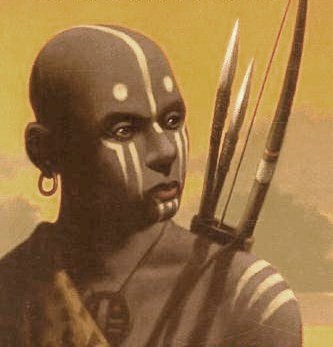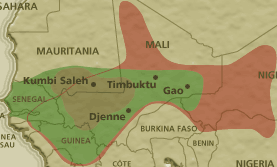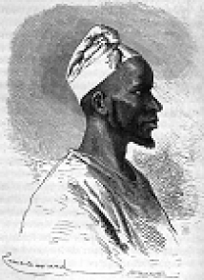Sundjata Keita, the lion king of Mali is next on in our series of great African heroes. Sundjata’s story proves to be a very interesting one filled with prophecies, magic and wits. Sundjata, is the founder of the Malian Empire. He is also known by different names like Mari Djata I, Songolon Djata, Sundjata Keyita.
Sundjata was born during a period of turmoil in West African history when the ancient empire of Ghana was in decline. The Ghana empire (the name of which was resurrected by the modern state of Ghana at Independence, though in a different place) had existed from the eighth to the twelfth centuries, covering an area which incorporated parts of the present day Mali, Mauretania, Chad and Senegal. The first ruler to defeat Ghana was Soumaoro of the Susu, but he in turn was defeated by Sundjata, Mansa or King of Mali, at the battle of Krina in 1235. This defeat of Soumaoro turned out to be the most significant event of Sundjata’s career.
From his capital at Niani on the Upper Niger, today a small village, Sundjata went on to create the empire of Mali incorporating much the same territory as the Ghana empire had done. For the two centuries following his death, Mali was among the most important states of the medieval world. By the mid-fifteenth century, Mali was itself superseded by the empire of Songhai
We get to know Sundjata through oral epic poems that passed from generation to generation of Mandinka griots till today and some writings by some Muslim Scholars who heard of his reign a century later. The famous Malian ruler Mansa Musa was his grandnephew.
Sundjata also (Sundiata) was born in 1210 in Niani, Mali close to the boarder of Guinea. but the interesting story begins long before then. His father was Naré Fa Maghan who was king over a small kingdom called Mali. One day, Naré was visited by a hunter who was also a diviner. He prophesied that the King was going to have a son who will the greatest king Mali will ever have. At the time, the king had many wives including, Sassouma who already had an eight year old son Dankaran Touman who was already heir apparent to the throne along with as well as 10 male children with other women.
The diviner were ahead to tell the King that he would have two visitors who were hunters and they will offer him a very ugly woman. In fact, the ugliest woman ,the King has ever seen. He said the King should marry her as she was going to be the mother of the greatest Malian King. He went on to say that the woman was a transformed buffalo who terrorized and killed many hunters and maimed not a few and that she was also hunchbacked. The king was told to offer a sacrifice for this to come to pass. The King did so immediately the diviner left.
When Queen Sassouma heard this, she was greatly embittered but it came to pass as the diviner had prophesied.
Sundjata was born by this woman, Sogolon Kedju and she was said to be endowed with extraordinary powers. Queen Sassouma tried all she could to kill the boy but Sogolon’s powers were too strong. The boy Sundjata grew to be lazy, gluttony and maim. At seven, Sundjata did not have any friends, would not walk, all he did was crawl on his fours and eat. It caused a deep concern for the King. Nevertheless, when the King was dying, he gave him a griot as a gift to signify his desire that the boy should become king after all. However, when king died, his first wife saw to it that her son, Dankaran, claimed the throne. Sundjata, who was still crawling would not do anything about it.
Sogolon was constantly being ridiculed because of Sundjata who was maim. One day, Sundjata would not take the insults and he told his mother that he was going to walk that day. Sundjata then told a blacksmith to make the heaviest possible iron rod for him, and then, with trembling legs and a sweaty brow, he proceeded to lift himself up, bending the rod into a bow in the process. Before an a crowd of amazed onlookers, Sundjata began to walk.
He soon became a leader among his peers and a threat to his half brother Dankaran who was now king in the stead of his father. Dankaran and his mother, Sassouma Bereté, became more cruel and resentful towards Sunjata and his mother.This forced Sojolon to go on exile with her children even though Sunjata was the rightful heir to his father’s throne. Before they left, Dankaran had sent Balla Fasséké, Sundjata’s griot, and one of Sundjata’s half-sister as gifts to the to the sorcerer king, Soumaoro Kanté. Soumaoro was the king of the Sosso, and he had been threatening all the kingdoms in the region with his growing army. The loss of his griot made Sundjata very angry and he swore to come back to claim his place as King.
They were in exile lasted for many years and they travelled to different countries within the Ghana Empire including Wagudu, the capital of the declining Ghana empire, where he learnt his military skills and much of the art of government and eventually to Mema where the king of Mema granted them asylum. He also acquired many skills like hunting, fighting, wielding of proverbs containing the wisdom of his ancestors.
It was said that Sundjata was admired by the King of Mema for his courage and tenacity. As such, he was given a great position. Later when the sorcerer King Soumaoro Kanté of Sosso also called Sumanguru conquered the Mandinka people and Dankaran who was a coward went on a self exile. The Mandinka people began to look for Sundjata to deliver them from the reign of the evil King Soumaoro as it has being prophesied.
Some Mandinkas saw Sundjata at Mema and persuaded him to come back to save his people. He was then given an army by the King of Mema to fight King Soumaoro Kanté of Sosso. Sadly, on the eve of his departure, his mother Sogolon, the once powerful buffalo woman, died.
Long before Sundjata’s birth, it had being prophesied to Soumaoro before Sundjata was born that he should enjoy all he had as a child will be born amongst his enemies that will kill him. Soumaoro was also told that there was nothing he would be able to do to harm this person when he appears. So Soumaoro lived in fear until the day Sundjata came to kill him.
All these years, Sundjata’s griot and his half-sisters were living in King Soumaoro Kanté of Sosso’s courts. Balla Fasséké, Sundjata’s griot has won his way into Soumaoro’s heart and became his griot. While his half sister had become Soumaoro’s favourite wife and had learnt all his secrets through trickery and wits.
On his way home, he passed through all the places he had come to known while on exile, as he did, he gathered skilled men to help fight Soumaoro. At first, Sundjata’s small army launched a surprise attack on Soumaoro’s forces at Tabon, near the Malian city of Kita and prevailed. This made the Sosso army to retreat.
At the next battle, Sundjata and Soumaoro came face to face. Again, Sundjata’s forces dominated the field through superior tactics, but Soumaoro kept escaping using his own formidable magic. Sundjata had magic too but he was not strong enough to conquer Soumaoro. Both armies were in the habit of using owls to deliver messages of bravado to the other warring camp. Sundjata was said to have terrified Soumaoro’s troops by roaring like a lion. While Soumaoro is regarded as the inventor of the balafon and the dan (a four-string guitar used by the hunters and griots). His power was also strengthened by eight spirits, who appeared above his head
Sundjata’s army kept growing but yet he knew he would not defeat Soumaoro with just a great army so he called some diviners and he was told to offer 100 white oxen, 100 white rams, and 100 white cocks. As the ritual slaughter began, Sundiata’s griot and his half-sister arrived at his camp. They had escaped captivity in Soumaoro’s city.
Sundjata’s half sister then went on to tell him Soumaoro’s secret, a weakness that could bring Soumaoro down. Armed with this knowledge, Sundjata went back to war against Soumaoro at the battle of Kirina in 1235.
He hit Sumanguru with an arrow that he had specially prepared with Sumanguru’s personal taboos. When the arrow struck him, but did not kill him. Legend had it that he disappeared, never to be seen again. When the Sosso army saw that their King had been conquered , they retreated. Sundjata went on to destroy Sumanguru’s kingdom of Sosso with fire and created a new Empire called the Empire of Mali.
He invited twelve kings of lands in the African savannah to the Gbara, or Great Assembly. There he “divided the world” with his allies. He created a constitution and outlined the Empire’s organization. Each king would remain ruler of his own lands, but all would be united within the Empire. Sundjata the first of the Mandinka line of kings to adopt the royal title Mansa ( King of Kings or emperor in the Mandinka language ). It is not known whether Sundjata was a muslim.
In 1240 Sundiata seized and razed Kumbi, the former capital of the Sudanese empire of Ghana, and by this act succeeded in obliterating the last symbol of Ghana’s past imperial glory. His Empire extended to include areas as far north as the southern fringes of the Sahara (including the important trade centre of Walata), east to the Great Bend of the Niger River, south to the goldfields of Wangara (the exact location is still unknown to scholars), and west to the Sénégal River.
Sundjata made Niani, Mali’s trading centre and his capital as it was situated on the upper Niger. He also controlled the lucrative trade routes linking West Africa’s Atlantic coast with the Arab trading posts in the Sahara. Gold was being taken from the gold mines and copper from present day Ghana which they sold to merchants from far and wide. He also made Agriculture more productive than it used to be .He introduced cotton and weaving to Mali. By so doing, Sundjata laid the groundwork for a thriving and united empire .
In 1255, It was said that Sundjata died accidentally, either from an arrow shot at random during a festival or by drowning in the Sankarani River.
However, in a wider perspective of 13th century West African military history , Sundjata has stood out as a great leader and a valiant warrior who was able to command the loyalties of his generals and army. Sundjata Keita was not merely a conqueror who was able to rule over a large empire with different tribes and languages. Towards the end of his reign, “absolute security” is reported to have “prevailed throughout his dominion.”


